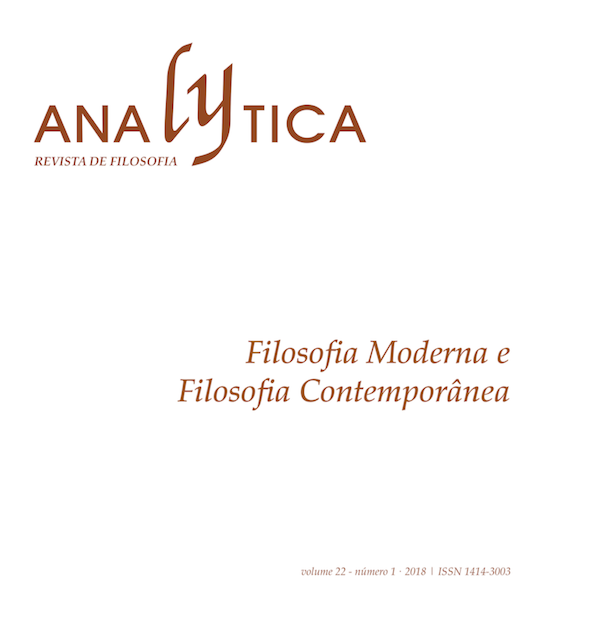Autonomia e determinação completa na Fundamentação da metafísica dos costumes
DOI:
https://doi.org/10.35920/arf.2018.v22i1.105-119Palavras-chave:
Kant, imperativo categórico, autonomia, determinação completa, categorias de quantidade, fio condutor.Resumo
RESUMO
Pretende-se sustentar que para compreender o princípio da autonomia como princípio supremo da moralidade na Fundamentação, isto é, como a fórmula que contém em si as outras fórmulas do imperativo categórico, é preciso interpretá-la mediante o princípio da determinação completa. Conforme a indicação de Kant de que ocorre uma progressão entre as fórmulas, segue-se o fio condutor das formas lógicas da quantidade em direção às categorias
da quantidade, tal como estabelecido na Crítica da razão pura. Ora, se a concepção kantiana de razão (em seus usos teórico e prático) pressupõe sua interpretação da lógica, então é de supor na relação entre as fórmulas do imperativo categórico a mesma relação que encontramos na combinação das categorias de quantidade.
Palavras-chave: Kant, imperativo categórico, autonomia, determinação completa, categorias de quantidade, fio
condutor.
ABSTRACT
We argue that to understand autonomy as the supreme principle of morality, that is, as the formula that contains the other formulas within itself, we have to understand it by means of the principle of complete determination. Following Kant’s remark that there is a progression among the formulas, we recall the problem of the guiding thread in the Critique of Pure Reason. Now, since Kant’s conception of reason (both theoretical and practical) depends
on his logic, it seems that to understand the relationship among the formulas of the categorical imperative, we have to understand the relationship among 1) transcendental unity, logical universality and formula of universal law/law of nature; 2) transcendental plurality, logical particularity and formula of humanity; 3) transcendental
totality, logical singularity and formula of autonomy/realm of ends.
Key-words: Kant, Categorical Imperative, Autonomy, Complete Determination, Categories of Quantity, Guiding Thread
Referências
Textos de Kant
Kants gesammelte Schriften. Berlin/Leipzig: G. Reimer. [Vários volumes.]
Crítica da razão pura. Trad. Valério Rohden. São Paulo: Nova Cultural, 1996.
Crítica da razão pura. Trad. Manuela Pinto dos Santos e Alexandre Fradique Morujão. Lisboa: Calouste Gulbenkian, 1997.
Critique of Pure Reason. Trans. and ed. Paul Guyer and Allen W. Wood. Cambridge: Cambridge University Press, 2000.
Crítica de la razón pura. Traducción, notas e introducción: Mario Caimi. Buenos Aires: Colihue Classica, 2007.
Crítica da razão pura. Trad. Fernando Costa Mattos. Petrópolis: Editora Vozes, 2012.
The Jäsche Logic. In Michael Young (trans. and ed.), Lectures on Logic. Cambridge: Cambridge University Press, 1992.
Lógica. Trad. Guido Antonio de Almeida. Rio de Janeiro: Tempo Brasileiro, 2003.
Grundlegung zur Metaphysik der Sitten. Mit einer Einl. hrsg. Von Bernd Kraft und Dieter Schonecker. Hamburg: Meiner 1999.
Groundwork for the Metaphysics of Morals, tr. Allen Wood. New Haven, Yale University Press, 2002.
Groundwork for the Metaphysics of Morals, tr. Thomas E. Hill Jr. and Arnulf Zweig. Oxford, Oxford University Press, 2002.
Groundwork of the Metaphysics of Morals. Trans. and ed. Mary Gregor. Cambridge: Cambridge University Press, 2010.
Foundations of the Metaphysics of Morals. Trans. with an introduction by Lewis White Beck. Upper Saddle River: Library of Liberal Arts, 1997.
Fundamentação da metafísica dos costumes. Tradução nova com introdução e notas por Guido Antônio de Almeida. São Paulo: Discurso Editorial: Barcarolla, 2009.
Fundamental Principles of the Metaphysic of Ethics. Trans. By Thomas K. Abbott. London: Longmans, Green, and Co, 1895.
Outros textos
ALLISON, H. (2011). Kant’s ‘Groundwork for the Metaphysics of Morals’: A Com mentary. Oxford: Oxford University Press. 10.1093/acprof:oso/9780199691531.001.0001
CODATO, L. (2004). Extensão e forma lógica na Crítica da razão pura. Discurso, São Paulo, (34), pp. 145-202. https://doi.org/10.11606/issn.2318-8863.discurso.2004.62839
GEIGER, I. (2015). How Are the Different Formulas of the Categorical Imperative Related? Kantian Review 20 (3), pp. 395 419. https://doi.org/10.1017/s1369415415000151
HERMAN, B. (2006). Reasoning to Obligation. Inquiry 49 (1), pp. 44-61. https://doi.org/10.1080/00201740500497415
_____ (2010). The Difference that Ends Make. In WUERTH, J. (ed). Perfecting Virtue: Kantian Ethics and Virtue Ethics. Cambridge: Cambridge University Press. pp. 92-115. https://doi.org/10.1017/cbo9780511973789.005
LONGUENESSE, B. (2005). Kant on the Human Standpoint. Cambridge: Cambridge University Press. https://doi.org/10.1017/cbo9780511487279
TIMMERMANN, J. (2007). Kant’s Groundwork of the Metaphysics of Morals: A Commentary. Cambridge: Cambridge University Press. https://doi.org/10.1017/CBO9780511487316
WOOD, A. W. (2001). The Moral Law as a System of Formulas. In STOLZENBERG H. and FULDA H. F. (eds.), Architektonik und System in der Philosophie Kants. Hamburg: Meiner Verlag. pp. 287-306.
_____ (2017). Formulas of the Moral Law. Elements in the Philosophy of Immanuel Kant. Cambridge: Cambridge University Press.
Downloads
Publicado
Edição
Seção
Licença
Os autores que publicam nesta revista concordam com os seguintes termos:
- Os autores mantêm os direitos autorais e concedem à revista o direito de primeira publicação, com o trabalho simultaneamente licenciado sob a Licença Creative Commons Atribuição-SemDerivações 4.0 Internacional (CC BY-ND 4.0), que permite a redistribuição, comercial ou não comercial, desde que a obra original não seja modificada e que seja atribuído o crédito ao autor.
- Os autores têm autorização para assumir contratos adicionais separadamente para distribuição não-exclusiva da versão do trabalho publicada nesta revista (ex.: publicar em repositório institucional ou como capítulo de livro), com reconhecimento de autoria e publicação inicial nesta revista.
- Os autores têm permissão e são estimulados a publicar e distribuir seu trabalho online (ex.: em repositórios institucionais ou na sua página pessoal) a qualquer ponto antes ou durante o processo editorial, já que isso pode gerar alterações produtivas, bem como aumentar o impacto e a citação do trabalho publicado (Veja O Efeito do Acesso Livre).


